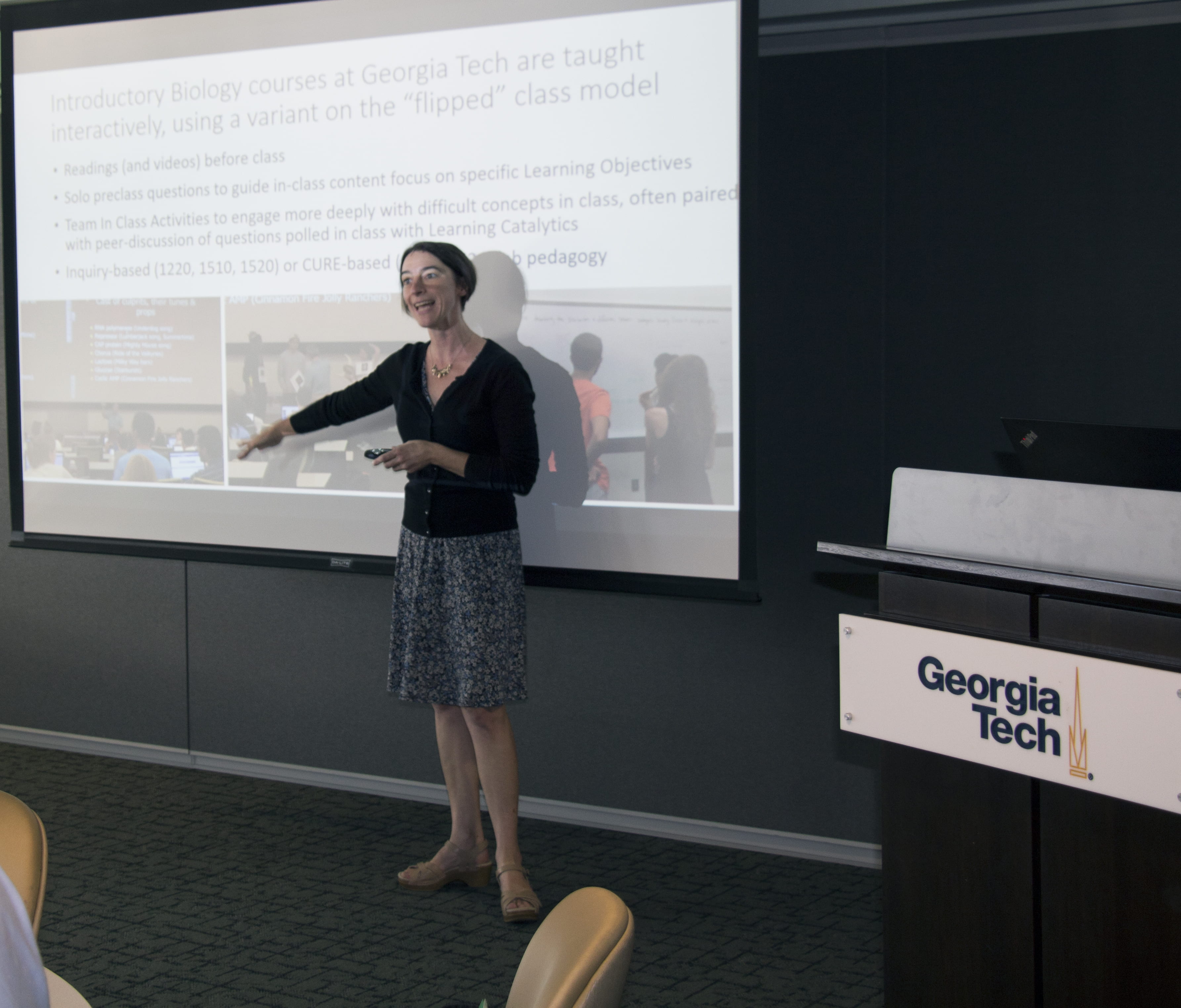Exploring OER Textbook Development in Teaching with Technology Spotlight

On October 5th the Center for Teaching and Learning hosted our first in a series of one hour sessions called Teaching with Technology Spotlight. To kick off this new spotlight series, we focused on the emerging movement towards cost-free Open Educational Resources (OER) and highlighted an innovative OER project to create a free OER textbook for Biological Principles (BIOL 1510) at Georgia Tech. Faculty in the School of Biological Sciences Chrissy Spencer, Jung Choi, and Shana Kerr received funding from an Affordable Learning Georgia grant to build their initial online textbook replacement. They tackled the project to reduce costs to students, improve learning gains in their flipped classroom course, and to improve the student perception of the textbook as a resource for learning.
The three faculty set out to create an Open Educational Resource because they found that most textbooks did not match their students’ needs. None of the textbooks from traditional publishers aligned with their course Learning Objectives and they discovered that those texts also tended to provide broad readings that seemed to distract students from the specific learning goals, hinder students metacognitively, and slow students’ ability to analyze, evaluate, and apply their knowledge. In addition, those traditional textbooks were expensive to purchase, and the cost seemed disproportionate relative to the perceived benefits to student learning. As a result of addressing these issues by creating their own OER textbook, Dr. Spencer stated that their “teaching has transformed because we ‘broke out of the box’ we had not realized we’d been working within.”
 Drs. Spencer, Choi, and Kerr have been hard at work to collect data to support their hypothesis that student learning would increase as a result of replacing the traditional textbook with the Open Education Resource. Even though educational research in the classroom is challenging due to the number of variables that must be controlled, the data they have already collected seems to support the conclusion that, at minimum, student learning did not measurably change after switching to their OER. As Dr. Spencer puts it “We ‘do no harm’ by replacing the textbook”, so usage of OERs in their courses continues as they collect further evidence to address their research question.
Drs. Spencer, Choi, and Kerr have been hard at work to collect data to support their hypothesis that student learning would increase as a result of replacing the traditional textbook with the Open Education Resource. Even though educational research in the classroom is challenging due to the number of variables that must be controlled, the data they have already collected seems to support the conclusion that, at minimum, student learning did not measurably change after switching to their OER. As Dr. Spencer puts it “We ‘do no harm’ by replacing the textbook”, so usage of OERs in their courses continues as they collect further evidence to address their research question.
Between increased student engagement and keeping the course interesting for the faculty involved, the team feels that creating the Open Education Resource “has been worth every hour we’ve invested in the process.” As a result of the apparent success of their initial OER development, Drs. Spencer and Kerr have partnered with other colleagues in the School to develop additional OERs for other courses they teach including the Biology of Sex & Death, Intro to Organismal Biology, as well as the majors sections of both Biological Principles and Intro to Organismal Biology. When asked what she wanted faculty to know about this experience, Dr. Spencer concluded, “It’s been exciting to teach familiar content using this new form of instructional delivery, and it’s taught us about how students learn. We encourage faculty to develop open education resources whenever possible. Each of us is happy to discuss our process and to brainstorm about open education resources.”
The Teaching with Technology Spotlight session itself was a great success with participants, who left the session with a greater knowledge of Open Educational Resources and were already forming plans on how to create and use this emerging platform to improve their own courses. We hope that you will join us for future sessions where we will highlight other innovative uses of technology from passionate educators from all parts of campus.




